Meditation enhances mental clarity, emotional resilience, and bio-hacking potential. Neuroscience research reveals its impact on brain structure and function, improving attention and emotion regulation. Regular practice increases grey matter density and promotes neuroplasticity, enabling better stress management and cognitive performance. Techniques like mindfulness and breath control optimise these benefits for daily life.
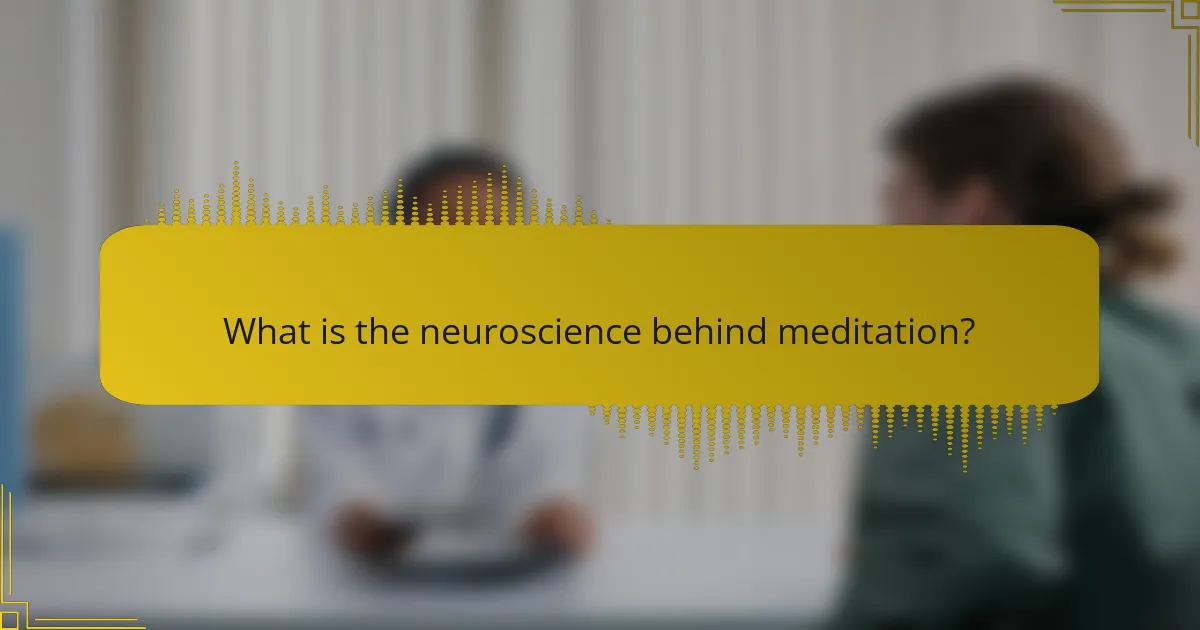
What is the neuroscience behind meditation?
Meditation influences neuroscience by enhancing mental clarity, emotional resilience, and bio-hacking potential. Research shows that regular meditation alters brain structure and function, particularly in areas related to attention, emotion regulation, and self-awareness. For instance, studies indicate increased grey matter density in the hippocampus and decreased activity in the amygdala, which is associated with stress response. These changes contribute to improved cognitive flexibility and emotional stability, enabling practitioners to manage stress more effectively. As a result, meditation serves as a powerful tool for optimising mental health and overall well-being.
How does meditation affect brain structure and function?
Meditation positively alters brain structure and function, enhancing areas linked to emotional regulation and cognitive flexibility. Studies show increased grey matter density in the prefrontal cortex, which is crucial for decision-making and self-control. Additionally, meditation fosters connectivity within the default mode network, improving mental clarity and reducing mind-wandering. These changes contribute to greater emotional resilience and overall mental well-being.
What are the key neural pathways involved in meditation?
Key neural pathways involved in meditation include the prefrontal cortex, amygdala, and insula. These areas regulate attention, emotional processing, and self-awareness. Research shows meditation enhances connectivity within these regions, promoting mental clarity and emotional resilience. The default mode network, active during rest, also shows altered activity patterns during meditation, indicating shifts in consciousness and focus. These neural adaptations contribute to the long-term benefits of meditation, such as reduced stress and improved cognitive function.
How does meditation influence neuroplasticity?
Meditation significantly enhances neuroplasticity, fostering brain adaptability and cognitive function. Regular practice promotes the formation of new neural connections, improving emotional resilience and mental clarity. Research indicates that mindfulness meditation can increase grey matter density in areas associated with memory, learning, and emotional regulation. Additionally, meditation reduces stress, which positively impacts neuroplasticity by creating a conducive environment for brain growth and development.
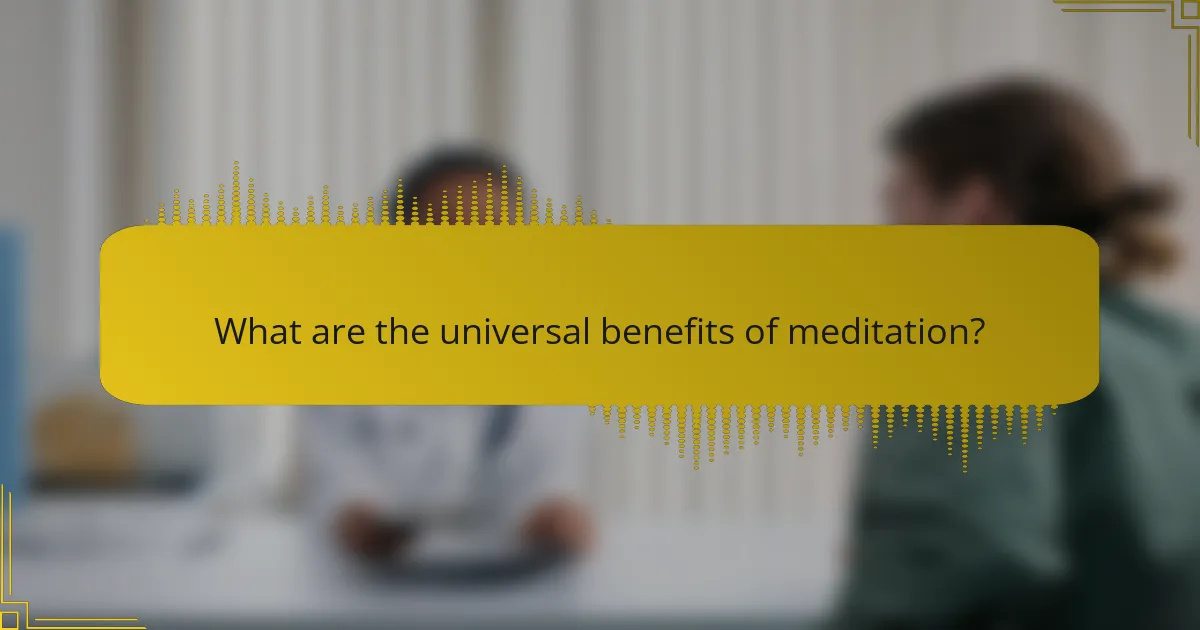
What are the universal benefits of meditation?
Meditation offers universal benefits, including enhanced mental clarity, emotional resilience, and bio-hacking potential. Neuroscience reveals that regular practice improves cognitive function and reduces stress. Studies show meditation can increase grey matter density in areas related to memory and emotional regulation, fostering overall well-being. As a result, practitioners often experience heightened focus and decreased anxiety, contributing to a more balanced life.
How does meditation enhance mental clarity?
Meditation enhances mental clarity by improving focus, reducing distractions, and fostering cognitive flexibility. Research indicates that regular practice alters brain structure, particularly in areas related to attention and emotional regulation. Enhanced neural connectivity leads to improved problem-solving skills and decision-making abilities. As a result, individuals experience heightened awareness and a clearer thought process, facilitating better responses to daily challenges.
In what ways does meditation promote emotional resilience?
Meditation enhances emotional resilience by fostering self-awareness and reducing stress. Regular practice strengthens neural pathways associated with emotional regulation. Research indicates that mindfulness meditation can decrease activity in the amygdala, the brain’s fear centre, leading to improved emotional responses. Additionally, meditation promotes the release of neurotransmitters like serotonin and dopamine, which enhance mood and emotional stability.
What role does meditation play in stress reduction?
Meditation significantly reduces stress by promoting relaxation and enhancing emotional regulation. Studies show that regular practice can lower cortisol levels, leading to improved mental clarity and resilience. Neuroimaging research indicates structural changes in the brain, particularly in areas associated with stress response and emotional control, supporting the notion that meditation is an effective bio-hacking tool for mental health.
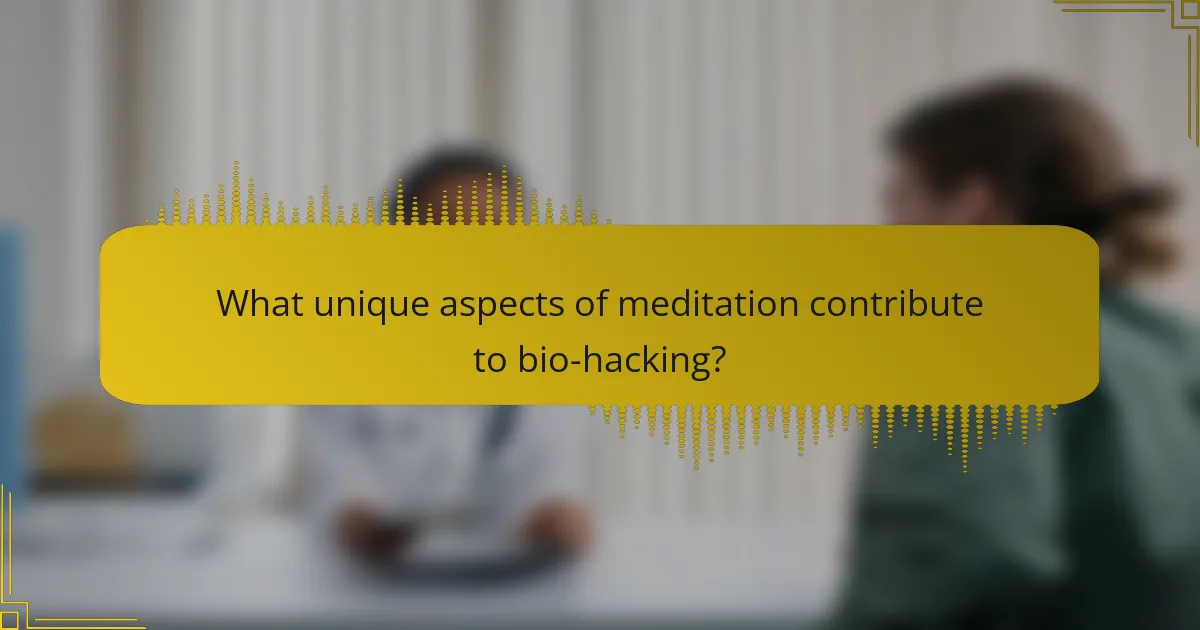
What unique aspects of meditation contribute to bio-hacking?
Meditation enhances bio-hacking through unique aspects like neuroplasticity, stress reduction, and improved focus. These attributes foster mental clarity and emotional resilience, enabling individuals to optimise cognitive performance. Research indicates that meditation can alter brain structure, promoting efficient neural pathways. As a result, practitioners experience enhanced creativity and problem-solving abilities, making meditation a powerful tool in bio-hacking.
How can meditation be tailored for individual bio-hacking goals?
Meditation can be customised to support individual bio-hacking goals by focusing on specific techniques and durations. Tailoring meditation practices can enhance mental clarity, emotional resilience, and overall cognitive performance. For instance, mindfulness meditation improves attention and reduces stress, while loving-kindness meditation fosters emotional well-being. Adjusting session lengths can also optimise benefits; shorter, more frequent sessions may enhance productivity, while longer sessions can deepen relaxation and insight. Personalising these elements aligns meditation with unique bio-hacking objectives, maximising its effectiveness.
What specific meditation techniques are most effective for bio-hacking?
Mindfulness meditation, transcendental meditation, and breathwork are effective techniques for bio-hacking mental clarity and emotional resilience. Mindfulness meditation enhances awareness and attention, while transcendental meditation promotes deep relaxation and stress reduction. Breathwork techniques improve oxygen flow and can alter emotional states, contributing to overall well-being. Each technique offers unique benefits, making them valuable tools in the neuroscience of meditation.
How does meditation integrate with other bio-hacking practices?
Meditation enhances bio-hacking practices by improving mental clarity and emotional resilience. Integrating meditation with techniques like neurofeedback, breathwork, and mindfulness enhances cognitive function and stress management. Research shows that these combined practices can optimise brain performance and promote overall well-being. This synergy creates a holistic approach to bio-hacking, leveraging the neuroscience of meditation for greater personal growth.
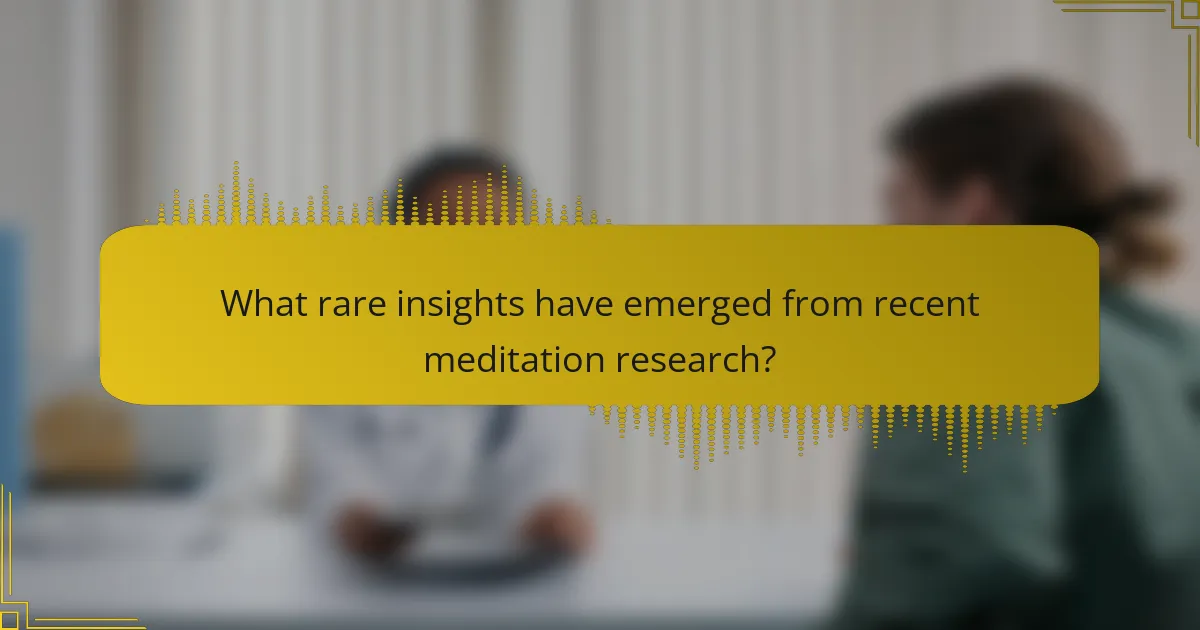
What rare insights have emerged from recent meditation research?
Recent meditation research reveals rare insights into the neuroscience of meditation, emphasising its profound effects on mental clarity and emotional resilience. Studies show that regular meditation alters brain structure, enhancing areas associated with attention and emotional regulation. Notably, participants exhibited increased grey matter density in the prefrontal cortex, linked to improved decision-making and stress response. Furthermore, neuroimaging indicates that meditation can enhance neuroplasticity, allowing individuals to adapt their thought patterns and behaviours. These findings suggest meditation not only benefits mental health but also serves as a potential bio-hacking tool for cognitive enhancement.
What groundbreaking studies have changed our understanding of meditation?
Recent groundbreaking studies have revealed that meditation significantly alters brain structure and function. Research indicates that consistent meditation practice enhances mental clarity, emotional resilience, and overall cognitive performance. For instance, studies using MRI scans show increased grey matter density in areas associated with memory and emotional regulation, highlighting the unique attribute of meditation’s impact on neuroplasticity. Additionally, findings suggest that mindfulness meditation can reduce stress and anxiety, showcasing its bio-hacking potential for improved mental health. These insights continue to reshape our understanding of meditation’s profound effects on the brain and well-being.
How do cultural perspectives shape the neuroscience of meditation?
Cultural perspectives significantly influence the neuroscience of meditation by shaping practices and outcomes. Different cultures emphasise unique meditation techniques, which affect brain activity and emotional processing. For instance, mindfulness meditation, rooted in Western practices, enhances attention and reduces stress, while Eastern traditions like Zen focus on awareness and acceptance, promoting emotional resilience. These cultural nuances lead to diverse neural adaptations, highlighting the role of context in meditation’s effectiveness. Research indicates that cultural background can modulate brain regions involved in self-regulation and emotional control, illustrating the interplay between culture and neuroscience in meditation practices.
What unexpected outcomes have been observed in long-term meditators?
Long-term meditators often experience unexpected outcomes such as enhanced emotional regulation, improved cognitive flexibility, and altered brain structure. Research indicates that consistent meditation can lead to increased grey matter density in areas associated with memory and emotional processing. Additionally, long-term practitioners report heightened awareness and reduced reactivity to stressors. Some studies suggest a unique attribute of meditation is its potential to foster neuroplasticity, allowing the brain to adapt and reorganise itself in response to sustained practice.
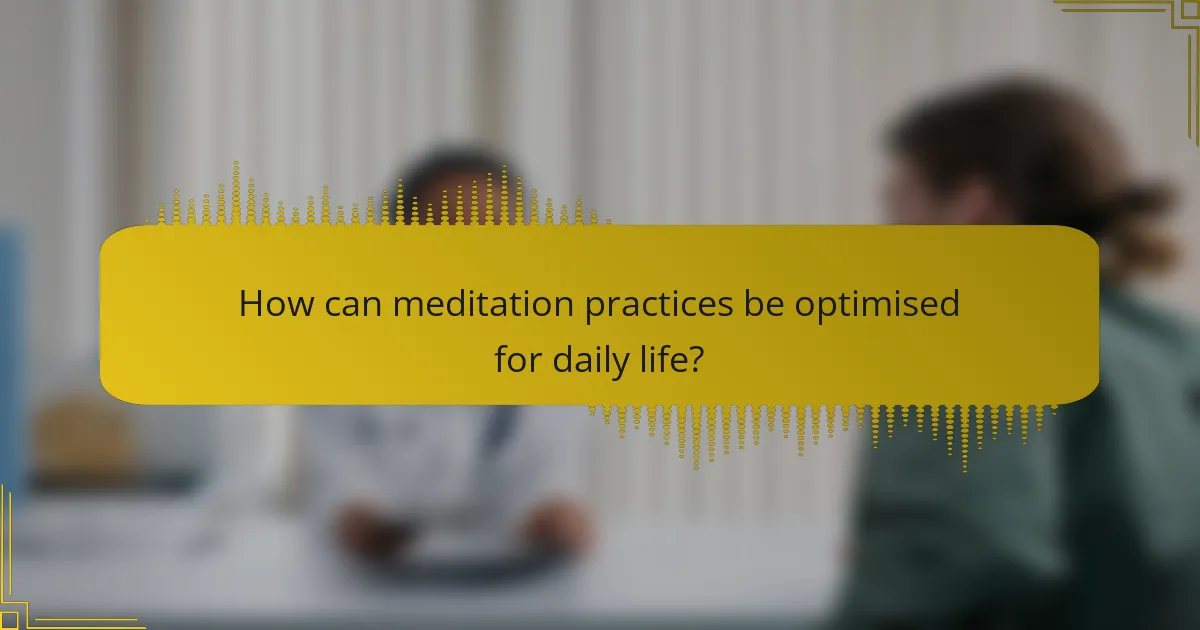
How can meditation practices be optimised for daily life?
Meditation practices can be optimised for daily life by incorporating short, focused sessions that enhance mental clarity and emotional resilience. Establish a consistent routine, even if just for five to ten minutes, to maximise neuroplasticity benefits. Utilise techniques such as mindfulness, breath control, and visualisation to engage the brain’s reward pathways. As a result, daily meditation can lead to improved cognitive function and stress reduction. Consider integrating meditation into existing habits, such as during breaks or commutes, to reinforce practice.
What are the best practices for incorporating meditation into a busy schedule?
Incorporating meditation into a busy schedule can enhance mental clarity and emotional resilience. Start with short, focused sessions of 5 to 10 minutes, gradually increasing duration as you become comfortable. Utilise breaks during the day for quick mindfulness exercises, such as deep breathing or body scans. Schedule meditation like an appointment to ensure consistency. Consider guided meditations available through apps, which can help streamline the process. Lastly, create a dedicated space for meditation to foster a calming environment, reinforcing the practice as a priority in your routine.
What common mistakes should be avoided when starting a meditation practice?
Starting a meditation practice requires avoiding common mistakes that hinder progress. Key mistakes include setting unrealistic expectations, neglecting consistency, and failing to create a conducive environment.
Unrealistic expectations can lead to frustration. Beginners often expect immediate results, such as instant mental clarity or emotional stability. Meditation is a skill that develops over time.
Inconsistency can disrupt the learning process. Regular practice is essential for building the neural pathways associated with meditation benefits. Aim for daily sessions, even if brief.
A conducive environment enhances focus. Distractions can impede the experience, so choose a quiet, comfortable space. Incorporating these strategies fosters a more effective meditation practice.
How can technology enhance meditation experiences?
Technology enhances meditation experiences by integrating neuroscience insights, enabling personalised practices and real-time feedback. Tools like apps and wearables track brain activity, guiding users to achieve deeper states of relaxation. Neurofeedback devices offer unique attributes, allowing users to visualise their mental states, fostering emotional resilience. Virtual reality meditation provides immersive environments, enhancing focus and reducing distractions. As a result, technology supports the bio-hacking potential of meditation, optimising mental clarity and emotional well-being.
What apps are recommended for guided meditation?
Meditation apps can enhance mental clarity and emotional resilience through guided experiences. Recommended apps include Headspace, Calm, Insight Timer, and 10% Happier. These platforms offer diverse meditation styles, durations, and user-friendly interfaces, supporting users in their mindfulness journeys.
How can wearables track meditation progress?
Wearables can track meditation progress by monitoring physiological signals such as heart rate variability, skin conductance, and brainwave patterns. These metrics provide insights into mental states and emotional resilience during meditation. For instance, increased heart rate variability often indicates improved relaxation and mental clarity. Additionally, some devices utilise EEG technology to assess brain activity, revealing changes associated with deep meditative states. This data allows users to quantify their meditation practice, identify patterns, and optimise their sessions for better outcomes.

What expert insights can enhance meditation effectiveness?
Expert insights can significantly enhance meditation effectiveness by incorporating neuroscience principles. Understanding brain activity during meditation reveals how it fosters mental clarity and emotional resilience. Techniques such as mindfulness-based stress reduction (MBSR) have shown to increase grey matter density in areas associated with memory and emotional regulation. Additionally, bio-hacking strategies, like neurofeedback, allow practitioners to optimise their meditation sessions by providing real-time feedback on brain activity. As a result, individuals can tailor their practices to maximise benefits, leading to improved focus and reduced anxiety.
What advice do neuroscientists offer for beginners?
Neuroscientists recommend starting with short, consistent meditation sessions to build a routine. Focus on breath awareness to enhance mental clarity and emotional resilience. Gradually increase session duration as comfort grows. Incorporating mindfulness into daily activities can further enhance benefits.
How can one measure the impact of meditation on personal well-being?
Meditation significantly enhances personal well-being by promoting mental clarity, emotional resilience, and stress reduction. Studies show that regular meditation practice can lead to measurable changes in brain structure and function, particularly in areas associated with emotional regulation and cognitive flexibility. For instance, research indicates that mindfulness meditation increases grey matter density in the hippocampus, which is linked to improved emotional health. Additionally, practitioners often report lower levels of anxiety and depression, contributing to an overall sense of well-being.
What resources are available for deeper exploration of meditation neuroscience?
Numerous resources exist for exploring the neuroscience of meditation. Books like “The Mind Illuminated” and “Altered Traits” provide insights into brain function and meditation practices. Research journals such as “Neuroscience Letters” publish studies on meditation’s impact on mental health. Online platforms like Coursera offer courses on mindfulness and neuroscience. Additionally, podcasts and documentaries can deepen understanding of meditation’s effects on emotional resilience and cognitive performance.